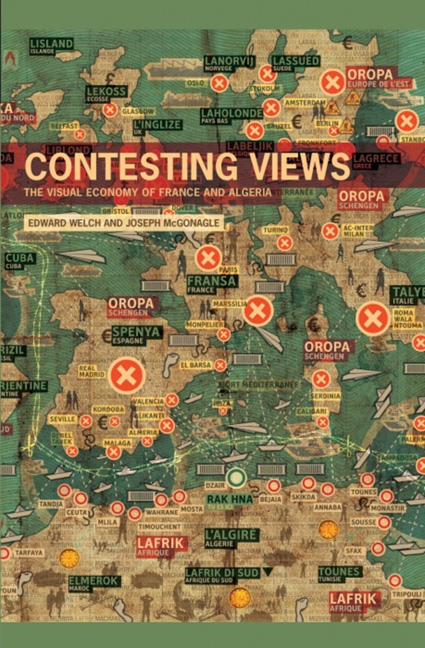Book contents
- Frontmatter
- Contents
- List of Illustrations
- Acknowledgements
- Introduction: Visualising the Franco-Algerian Relationship
- I Algerian Pasts in the French Public Sphere
- 1 Wish We Were There: Nostalgic (Re)visions of France's Algerian Past
- 2 Visions of History: Looking Back at the Algerian War
- 3 Out of the Shadows: The Visual Career of 17 October 1961
- II Mapping Franco-Algerian Borders in Contemporary Visual Culture
- Conclusion
- Notes
- Bibliography
- Index
2 - Visions of History: Looking Back at the Algerian War
from I - Algerian Pasts in the French Public Sphere
- Frontmatter
- Contents
- List of Illustrations
- Acknowledgements
- Introduction: Visualising the Franco-Algerian Relationship
- I Algerian Pasts in the French Public Sphere
- 1 Wish We Were There: Nostalgic (Re)visions of France's Algerian Past
- 2 Visions of History: Looking Back at the Algerian War
- 3 Out of the Shadows: The Visual Career of 17 October 1961
- II Mapping Franco-Algerian Borders in Contemporary Visual Culture
- Conclusion
- Notes
- Bibliography
- Index
Summary
Making Visible the Algerian War
If the 1990s and 2000s were marked by a growth of photo-books and other visual material restaging, celebrating and mourning French Algeria, the period was defined too by persistent debate within France, particularly among historians, over the visual representation of the Algerian War and its relationship to collective memory of the conflict. The issue was first raised by Benjamin Stora in his groundbreaking work of 1991,La Gangrène et l'oubli [Gangrene and Forgetfulness]. Stora (1991: 248) argued that French amnesia in relation to the war could be linked to the lack of visual images in circulation subsequent to it. In particular, he suggested, the conflict seemed to lack the potent or iconic images around which narrative, memory and history could coalesce as they had for other conflicts, and most notably the Vietnam War. For Stora, the Algerian War was a conflict more written about than seen (1991: 255). As such, it would demonstrate by exception the importance of the visual image as a catalyst for collective memory and historical narrative. Moreover, argued Stora in later work, a corollary of the conflict's subsequent disappearance from sight was the emergence of an enduring myth – one which he was at pains to challenge – that the Algerian War was invisible at the time as well, largely unmediated by the visual image (2009: 13).
Since his initial intervention, Stora and other historians have been working on a variety of fronts in order to foreground and develop understanding of what we termed in the Introduction, following Deborah Poole, the ‘visual economy’ of the Algerian War. They have drawn attention to both the mediation of the conflict by the visual image and the processes regulating the flow and circulation of those images within French (and to a lesser extent, Algerian) culture at the time of the conflict and subsequently. In the first place, historians of the war have examined the range of visual material in circulation during the conflict, and the conditions of its production within, and as part of, the French military apparatus.
- Type
- Chapter
- Information
- Contesting ViewsThe Visual Economy of France and Algeria, pp. 39 - 64Publisher: Liverpool University PressPrint publication year: 2013



